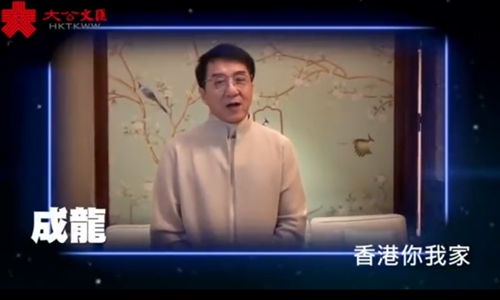LIFE / CELEBRITY
Action star Jackie Chan has filed lawsuit concerning seized Beijing apartments

Jackie Chan calls for restoring Hong Kong social order in the one-minute video clip. Photo: screenshot of video posted by takungpao.com.
Chinese martial arts star Jackie Chan issued a statement through his agency on Sunday concerning the status of the star's two apartments in central Beijing which were seized and are set to go up for auction. The statement noted that the star has already filed a lawsuit concerning the properties and that since this litigation is still ongoing it was not convenient for him to disclose more details to the public.
The statement came after news hit the internet that his two luxury Beijing apartments worth a total of 100 million yuan ($14.6 million) were set to go up for auction for about 71.91 million yuan.
According to reports, Chan bought the two apartments in 2006 for 33.6 million yuan, but actually only paid 13 million yuan after he became the spokesman of the developer Yujia Real Estate for an endorsement fee of 20.6 million yuan, which he waived in exchange for the property.
The dispute over ownership of the properties stems from the fact that developer never actually completed the transfer of ownership for the properties. According to a report from ifeng.com's business channel, it is believed that ownership was not transferred because the developer would have had to publicly reveal when processing the property rights certificate that Chan actually only paid nearly one-third the properties' price.
Some Chinese netizens commented on social media that Jackie Chan did not hurry to get the ownership in order to escape paying tax on his endorsement fee of 20.6 million yuan.
"Since Chan did not have a real estate certificate, he probably hasn't paid the tax for purchasing the apartments, so some details need to be confirmed," Shen Binti, a lawyer based in Beijing, told the Global Times on Monday.
The two properties were seized for auction to pay debts owed by Yujia.
In 2018, the Beijing's tax administration audited the company and found that it had evaded paying 7.699 million yuan in taxes from 2008 to 2015. It was then fined 93.35 million yuan by the administration.
Meanwhile, the developer also became tied up in a dispute over payments with another developer Tenhong Real Estate.
In July, a court ordered the seizure of Yujia's assets and ordered them to be sold.
Since the transfer of ownership never occurred, the two disputed apartments were seized by the government as part of the Yujia asset sales.
According to the ifeng.com report, Chan is most likely seeking to use the private transaction contract he signed with Yujia in 2006 as proof that he is the legal owner of the properties.
The two apartments are located in Dongcheng district, Beijing. After their purchase Chan renovated the neighboring properties into a 1,217 square meter residence with three living rooms and six bedrooms.
The 66-year-old superstar and his family have been living at the residence since 2007. His son Jaycee Chan was caught at the residence with another star Ko Chen-tung from Taiwan island in 2014 while in possession of more than three ounces of marijuana, and was sentenced to six months in jail, according to reports.
Zhang Qihuai, a lawyer who has previously handled cases for many Chinese celebrities, told the Global Times on Monday that the failure to transfer ownership rights to Chan may not have been solely Yujia Real Estate's decision.
"It is possible that Jackie Chan was also unwilling to make public the fact that he had bought the real estate at such a low price due to his public image," said Zhang.
He suggested that since the two parties signed a real estate purchase contract, Chan could apply for a property ownership certificate. However, in view of the fact that the real estate has been seized for auction, Chan will have to first file a breach of contract lawsuit against Yujia Real Estate.
Chan's next film Vanguard is scheduled to hit Chinese theaters on September 30, the day before China's National Day.


